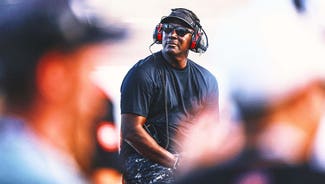
Economic times forcing teams to seek new sponsors
Kevin Conway is a walking billboard for - how can we say this delicately? - better performance in the bedroom.
``That's kind of the elephant in the room,'' he says with a mischievous grin, wearing a race suit with the word ``ExtenZe'' around his neck, across his chest and back, and down the sides of both legs.
All giggling aside, the sponsorship deal for the No. 37 car shows how teams must look beyond conventional sponsors in these tough economic times. This is a sport that requires more than just a fast car and a talented driver; someone's got to be willing to foot the bill with a lot of zeros on the check.
Which brings us to Conway, a 30-year-old, college-educated rookie who knew he'd need more than just a heavy right foot to break into the Sprint Cup series.
Like anyone who's had trouble sleeping, he'd seen one of those bawdy ExtenZe infomercials sandwiched between pitches for stay-at-home jobs that will turn you into an instant millionaire and video collections for long-ago television shows.
Hmmm, he thought, wonder if ExtenZe would be willing to sponsor a stock car?
``If you look back a few years ago, there was no such thing as an energy drink. Red Bull kind of created that category, much the same way ExtenZe has done for the male enhancement category,'' said Conway, who majored in marketing at UNC Charlotte.
``It's the heart of America,'' said Robert Wilhovsky, the company's director of motorsports marketing. ``You reach a real loyal, passionate customer base that sticks with you. They appreciate and understand your involvement in their sport, their way of life, and it resonates well with them. They, in turn, thank you at the counter.''
Conway, however, has had a tough time as a Cup rookie. He wasn't approved to race in the season-opening Daytona 500 because of a lack of superspeedway experience, and he hasn't finished higher than 31st in his three starts. The team needs to be in the top 35 to maintain its automatic spot in the field after the next event at Bristol; Conway is 40th.
Although he said there was some resistance at first from NASCAR officials it didn't take much of a selling job. After all, the series once had a car sponsored by Viagra.
``If you look back historically, particularly in the last 10 years, NASCAR has attracted a broad spectrum of sponsors,'' said Ramsey Poston, the series' managing director of corporate communications. ``We've seen more sponsors coming into the sport, which is encouraging.''
Especially at a time when many teams have folded or merged because of a lack of sponsorship dollars. NASCAR, like every other major sport, has felt the sting of the economic downturn, though Poston said some recent deals indicate the worst is over.
To pay the bills, teams have been forced to look beyond the base of beer companies, home improvement stores and package delivery services.
For last weekend's race at Atlanta, Greg Biffle was sponsored by the U.S. Census Bureau in the first of a three-race, $1.2 million package.
``Get those Census forms in,'' Biffle quipped. ``If you don't send your form back, I'm going to be at your doorstep.''
Although it might be difficult to tell from the potpourri of logos at a NASCAR track, Poston said there are standards when it comes to approving sponsors.
First, the product must be legal.
``Absolutely, there are limits,'' he said. ``We have a lot of casinos that are title sponsors and car sponsors. But right now, the gray area is online gaming.''
There's no such gray area with Conway's sponsor. That hasn't stopped the junior-high-level humor, so the company decided it was best to go along with the joke (in contrast to Viagra, which refused to make light of its product during its stint in NASCAR).
The team sells shirts on its Web site and from its merchandise trailer that turns up at the track each week.
``Everybody's had a good time with it,'' Conway said. ``And everybody just wears us out for samples.''

